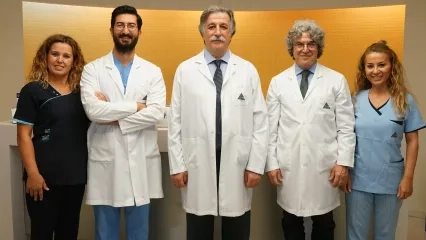Alo Yeditepe
Alo Yeditepe
Useful Bacteria Increases IVF Success
A study conducted in Spain revealed that beneficial bacteria in the uterus increased the success of IVF treatment, which was applied to pave the way for women whose tubes were damaged, clogged, or without tubes to become mothers. Obstetrics and IVF Specialist Prof. Dr. Erkut Attar considered the study as a ‘new glimmer of hope‘ for families who want to have children. Prof. Dr. Attar: “The absence of beneficial bacteria reduced the embryo's rate of adhesion to the uterine wall from 60.7 percent to 23.1 percent. This is a very important finding.''
One of the most preferred infertility treatments today is the ‘IVF’ method. It was revealed that the beneficial bacteria in the uterus affected the success of the IVF treatment performed by combining the egg and sperm in the laboratory and transferring the embryo obtained after fertilization to the mother's womb.
According to a study conducted at IVI, one of Spain's leading IVF clinics, beneficial bacteria in the flora in the uterus affect the chance of success of IVF treatment. Yeditepe University Hospitals Gynecology and Obstetrics, IVF Specialist Prof. Dr. Erkut Attar interpreted the study as a 'glimpse of hope‘ for families who want to have children.
Measurement of Beneficial Bacteria is Recommended Before Starting IVF Treatment
Prof. Dr. Attar said, “The uterus is not sterile, it contains bacteria. There are even bacteria in the liquid inside the ovary. In the absence of beneficial bacteria called lactobacillus in yogurt and kefir, important findings have begun to be obtained that the success of in vitro fertilization has decreased. Therefore, in the absence of beneficial bacteria for the uterus, IVF success is negatively affected. The reason for the recurrent miscarriage during the IVF procedure may be due to the lack of beneficial bacteria. In IVF patients, in case of repeated failures, useful bacteria should be measured. After the uterine flora is corrected, the chance of success increases.”
It Affects The Success of Having A Baby
In the study, samples were taken from the wombs of 23 women who had children and 35 women who had children by IVF method. Accordingly, it was determined that women with a higher concentration of beneficial bacteria called lactobacillus in their uterus had a higher chance of conceiving with the IVF method.
Yeditepe University Hospitals Obstetrician Prof. Dr. Erkut Attar: “If there are beneficial bacteria in the uterus, the rate of adhesion of the embryo to the uterine wall is 60.7 percent. In the absence of bacteria, the percentage dropped to 23.1 percent. Pregnancy rates also fell from 70.6 percent to 33.3 percent if there were no beneficial bacteria. There are large differences in the ongoing pregnancy rates. If there are beneficial bacteria, the pregnancy rate is 58.3 percent, but if not, this rate has fallen to 13.3 percent. Live birth rates are even more impressive. If there are no beneficial bacteria, it has dropped from 58.8 percent to 6.7 percent.”
If There Are No Beneficial Bacteria In The Uterus, The Possibility of The Embryo Forming Decreases
Stating that the success rate in IVF is 50% in the world, Prof. Dr. Attar: “This rate varies depending on the age and condition of the patient. In some of the remaining 50 percent, the embryo may not stick to the uterus. In fact, 10 percent of patients do not have fertilization for any reason. We insert the embryos into the uterus, but they cannot adhere to the uterine wall. Studies on the microbiota have shown that in many of these patients, the absence of beneficial bacteria in the uterus that support the adhesion of the embryo may be the cause.”
Dental Caries Negatively Affects Beneficial Bacteria
Stating that one of the most important factors for protecting and reproducing beneficial bacteria is nutrition, Prof. Dr. Erkut Attar: “It is necessary to pay attention to oral health and oral hygiene. There should be no tooth decay. Because the oral flora directly affects the intestinal flora. Misused antibiotics also kill beneficial bacteria. “People are taking antibiotics unnecessarily and unconsciously like they are taking painkillers.”
Intrauterine Bacteria Measurement Tells the Proportion of Beneficial Bacteria
Stating that bacteria measurement was performed for the uterus in women who thought of IVF, Yeditepe University Hospitals IVF Specialist Prof. Dr. Erkut Attar stated the following: “It is not a difficult process. Measurements are completed within 10 days. We take samples from inside the uterus and look at the ratios of beneficial bacteria. At the end of the measurement, we learn whether there are beneficial bacteria in the uterus. The higher the rate of beneficial bacteria, the greater the chance of success. We encourage the patient to use probiotics, refer them to the dentist, and we can increase the rate of beneficial bacteria by preventing the wrong use of drugs.
Consume Yoghurt, Kephir, Pickles
Suggesting the consumption of foods with probiotic properties such as yogurt, kephir, milk, and pickles, Prof. Dr. Attar: “These nutrients revitalize and regulate the intestinal flora. Ready and fast foods and canned foods are harmful to beneficial bacteria. One of the biggest mistakes we make is washing the inside of the vagina. Women do it for hygiene purposes, but the bacteria in the uterus are negatively affected. We have to stop this habit. Be careful with the detergent you use, prefer cotton underwear.”
Beware of Cervical Infections
Drawing attention to the fact that the vaginal flora changes with age, Prof. Dr. Erkut Attar: “With nutrition, we can protect beneficial bacteria by paying attention to oral health. Cervical infections also disrupt the cervical flora and adversely affect fertility. That is why it needs to be treated.”
Press Reflections: aksam.com | cnnturk.com | haberler.com | hurriyet.com | milliyet.com | posta.com | yenicaggazetesi.com | gazetevatan.com
About
Faculty and Year of Graduation:
Istanbul University, Cerrahpasa Medical School 1986
”
See Also
- Contraceptive Methods: Birth Control and Effective Protection Options
- Genetic Diagnosis in IVF Treatment
- What Happens at 3rd Weeks of Pregnancy?
- What Happens at 2nd Week of Pregnancy?
- What is Endometriosis? What are the Symptoms of Endometriosis?
- What is Pelvic Floor? What are Their Duties?
- The Most Common Diseases in Women
- What is Hysteroscopy? Hysteroscopy Usage Areas
- Early Menopause and Ovarian Failure Can Be Prevented
- Polycystic Ovary Syndrome and its Treatment
- Electromagnetic Stimulation in the Treatment of Endometriosis and Infertility
- Causes of Female Infertility
- Chronic Pelvic Pain
- What is Polycystic Ovary Syndrome/PCOS?
- Postpartum Period
- The Chance of Becoming a Father Increases with Microchip Technology
- Thanks to the Ovarian Rejuvenation Method, She Counts the Days for Birth!
- Some Patients Go Through Menopause Even at the Age of 15
- Polycystic Ovary Syndrome Can Occur If the Bacteria in the Gut Are Not Functioning Well
- Imaging Methods During Pregnancy
- After 16 Years, She Wanted to Be a Mother Again; She Experienced the Shock of Her Life
- These Diseases Affect Women Differently Than Men
- Beware of Chocolate Cyst! It Affects 1 in 10 Women
- Causes of Male Factor Infertility
- The Effect of Advanced Age on IVF Treatment
- Infertility
- Polycystic Ovary Syndrome
- Early Menopause
- Blocked Fallopian Tube
- Vaginismus
- Low Ovarian Reserve (AMH)
- Which Methods Increase Success in Treatment of Infertility?
- Intrauterine insemination (IUI)
- Microinjection
- Egg Cryopreservation
- Assisted Hatching
- Micro-chip
- Pre-implantation Genetic Diagnosis
- Endometriosis
- Co-Culture
- Ovarian Rejuvenation / PRP
- This Problem Ruins the Lives of One in Every 10 Women
- Prof. Dr. Attar: Endometriosis Can Be Associated With Some Chronic Diseases
- What Happens at 38 Weeks of Pregnancy?
- What Happens at 37 Weeks of Pregnancy?
- What Happens at 36 Weeks of Pregnancy?
- What Happens at 35 Weeks of Pregnancy?
- What Happens at 34 Weeks of Pregnancy?
- What Happens at 33 Weeks of Pregnancy?
- What Happens at 32 Weeks of Pregnancy?
- What Happens at 31 Weeks of Pregnancy?
- What Happens at 30 Weeks of Pregnancy?
- What Happens at 29 Weeks of Pregnancy?
- What Happens at 28 Weeks of Pregnancy?
- What Happens at 27 Weeks of Pregnancy?
- What Happens at 26 Weeks of Pregnancy?
- What Happens at 25 Weeks of Pregnancy?
- What Happens at 24 Weeks of Pregnancy?
- What Happens at 23 Weeks of Pregnancy?
- What Happens at 22 Weeks of Pregnancy?
- What Happens at 21 Weeks of Pregnancy?
- What Happens at 20 Weeks of Pregnancy?
- What Happens at 19 Weeks of Pregnancy?
- What Happens at 18 Weeks of Pregnancy?
- What Happens at 17 Weeks of Pregnancy?
- What Happens at 16 Weeks of Pregnancy?
- What Happens at 15 Weeks of Pregnancy?
- What Happens at 14 Weeks of Pregnancy?
- What Happens at 13 Weeks of Pregnancy?
- What Happens at 12 Weeks of Pregnancy?
- What Happens at 11 Weeks of Pregnancy?
- What Happens at 10 Weeks of Pregnancy?
- What Happens at 9 Weeks of Pregnancy?
- What Happens at 8 Weeks of Pregnancy?
- What Happens at 7 Weeks of Pregnancy?
- What Happens at 6 Weeks of Pregnancy?
- What Happens at 5 Weeks of Pregnancy?
- What Happens at 4 Weeks of Pregnancy?
- What Happens at 1st. Weeks of Pregnancy?
- Considerations for Embryo Transfer
- What Causes Menstrual Irregularity, How Is It Treated?
- Success in IVF after 43 Decreases to Five Percent
- Does Pregnant Coronaviruses Affect?
- Most Frequently Asked Questions During Pregnancy
- 1 in 10 Women Have This Problem; It Can Lead To Infertility
- Effective Results Can Be Achieved with PRP in Women with Low Egg Count
Alo Yeditepe







